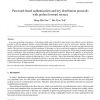Free Online Productivity Tools
i2Speak
i2Symbol
i2OCR
iTex2Img
iWeb2Print
iWeb2Shot
i2Type
iPdf2Split
iPdf2Merge
i2Bopomofo
i2Arabic
i2Style
i2Image
i2PDF
iLatex2Rtf
Sci2ools
123
click to vote
JCSS
2006
2006
Password-based authentication and key distribution protocols with perfect forward secrecy
In an open networking environment, a workstation usually needs to identify its legal users for providing its services. Kerberos provides an efficient approach whereby a trusted third-party authentication server is used to verify users' identities. However, Kerberos enforces the user to use strong cryptographic secret for user authentication, and hence is insecure from password guessing attacks if the user uses a weak password for convenience. In this paper, we focus on such an environment in which the users can use easy-to-remember passwords. In addition to password guessing attacks, perfect forward secrecy (PFS in short) is another important security consideration when designing an authentication and key distribution protocol. Based on the capability of protecting the client's password, the application server's secret key, and the authentication server's private key, we define seven classes of perfect forward secrecy and focus on protocols achieving class-1, class...
Related Content
| Added | 13 Dec 2010 |
| Updated | 13 Dec 2010 |
| Type | Journal |
| Year | 2006 |
| Where | JCSS |
| Authors | Hung-Min Sun, Her-Tyan Yeh |
Comments (0)

